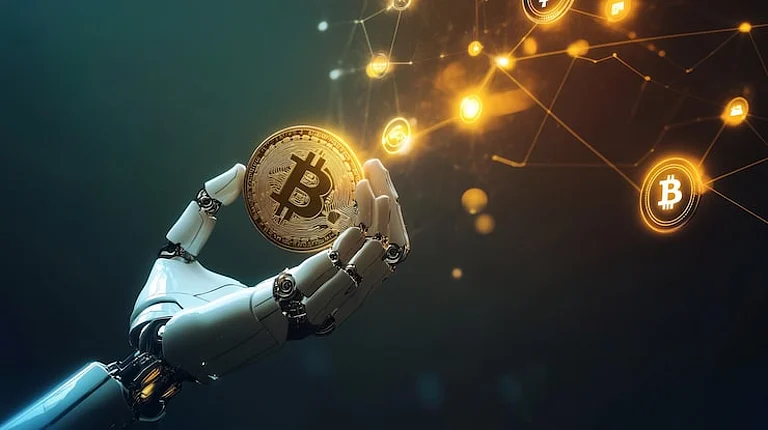The New Digital Democracy Frontier
Decentralized Autonomous Associations( DAOs) have changed the paradigm for how associations, systems, and companies can live without central leadership. Grounded on the principles of cooperative decision- timber, DAOs allow stakeholders to bounce on proffers, budgets, and policy and set the direction of the association through open, community- driven processes. But as these systems are born, a new contender is knocking on the door of DAO governance — artificial intelligence.
The question is both simple and deeply challenging: should algorithms have a place in DAO decision- making? And, if so, to what extent?
The Rise of AI in Governance exchanges
As DAOs continue to develop, they face more and more problems of effectiveness, namer turnout, and raw decision complexity. The appearance of AI in this space is n't important of a shock. Algorithms have been used for times to overlook information, make request prognostications, and aid in threat operation. Their capacity to reuse information far exceeds any single namer's.
In DAO communities, where proffers may involve specialized complications, profitable models, or indeed governance models that need technical knowledge, AI presents itself as a implicit companion, helping communities make informed opinions. There has indeed been the proposition of granting AI voting rights, or at least premonitory votes that carry significant weight. But integrating AI into a popular frame presents moral, ethical, and philosophical questions that need to be addressed by the DAO community.
Effectiveness vs. Mortal Values
At first regard, making AI help in the governance of DAOs appears to be a logical enhancement. Algorithms can overlook through multiple indispensable scripts, find out what can go awry, and give druthers grounded on information rather than emotion or particular vagrancy. That would simplify decision- timber, reduce mortal fallibility, and enable DAOs to make further informed choices with complicated opinions.
But governance is n't all about sense. opinions will reply to community values, collaborative fancies, and indeed artistic nuance that an algorithm can not. DAOs are not simply businesses they're communities. Their choices reflect the expedients of their members inclusively, fueled by empathy, concession, and debate. Assigning voting power to AI potentially disenfranchises these mortal factors in favor of detached effectiveness.
The Threat of Algorithmic Bias
perhaps the topmost problem in applying AI to governance is the threat of bias. Algorithms are not so important neutral; they are a product of the data they are trained on and the design choices of their generators. Who would AI systems represent if they shared in governance – whose values and hypotheticals? Would impulses bedded in law quietly bias opinions in favor of certain groups or interests?
Under the DAO paradigm, where translucency and equity are keystones, this is a parlous proposition. Members would need to have acceptable appreciation of how algorithms are enciphered, what data they draw upon, and how they arrive at conclusions. Without it, the legality of the governance process might be eroded, and the beginning principles upon which DAOs were erected might be compromised.
The Question of Responsibility
Responsibility is another challenge. In mortal government, choosers can be held responsible for their votes, through character, community review, or mechanisms of government. How does one hold an algorithm responsible, however? If an AI- grounded vote results in damaging goods, who's to condemn — the creator, the DAO, or the algorithm?
This absence of definitive responsibility creates a legal and moral argentine area that current models of governance are ill- equipped to handle. For DAOs that are passionate about decentralization and group decision- timber, the preface of an actor that can not be held responsible may weaken their veritably founding morality.
A Part as Counsels, Not Choosers
The maturity of DAO members and thinkers endorse a middle ground. Rather than assigning AI voting rights outright, algorithms would serve as important premonitory tools. They would dissect proffers, identify implicit pitfalls, and make statistically grounded prognostications, and mortal members would retain the ultimate decision- making authority. In this function, AI aids the governance system without infringing on the mortal agency upon which it's innovated.
This mongrel model allows DAOs to influence AI’s strengths — recycling speed, prophetic modeling, and objective analysis — while conserving the values of popular participation and collaborative wisdom. The community remains at the center of decision- timber, informed but not overruled by algorithms.
Future is Cooperative
The crossroad of AI and DAO decision- making brings both the thrilling prospect and the profound challenges. As decentralized communities trial with the limits of what new forms of tone- governance are possible, it'll be necessary to strike a balance between the humane influence and the robotization. The thing can not be to replace mortal judgment but to enhance it with the functionality offered by AI.
Eventually, the substance of any DAO is its community — its actors, their voices, their values. AI can be a awful addition to DAO structure but always a finely balanced, transparent, and subservient menial to the will of the mortal philanthropy. In this new world of virtual courage, intelligence stays in mortal hands with AI as a pious comrade, not overlords.

























